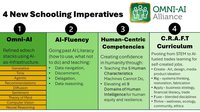OAKLAND, CA (March 7, 2019) Access to education data can help parents, educators, policymakers, researchers, and advocates understand how our schools are educating our children and preparing them for a successful future. The data can uncover successes to celebrate and learn from; it can also reveal gaps where improvements may be desperately needed. Yet there is a wide variation in how states provide this important information about our public schools. Today, GreatSchools.org released a new report, “Finding the Data: A State-by-State Assessment of Education Data Transparency.” For the first time, we can see which states are openly sharing education data with a variety of stakeholders in ways that allow them to easily use the data to glean insights and to take action.
The report examines seven data types, including test scores, student growth (which tracks individual student improvement over time on test scores), college readiness, and postsecondary success measures (e.g. students who persist in college to second year and students who take remedial courses). Based on this information, all 50 states (and D.C.) are rated based on their data reporting practices across three broad dimensions of transparency: accessibility and access, quality, and disaggregation for key demographic student groups.
“GreatSchools.org gathers available school-level measures from all 51 state departments of education, giving us a distinct perspective on data transparency,” said Orville Jackson, Senior Director of Data Strategy for GreatSchools.org. “We know that transparency can help build trust and that conversations about schools, and efforts to improve schools, are better and more effective when informed by data.”
For 20 years, GreatSchools.org has been collecting data on school quality. Forty-three million users — an estimated half of America’s parents — turn to GreatSchools.org annually, where they can find a profile for every school in the nation. Additionally, researchers and grassroots advocacy organizations rely on the value that third parties like GreatSchools.org provide in bringing to light the data from state and federal sources and making that data actionable to a wider range of stakeholders.
"Providing parents with access to accurate information in an accessible format is a priority for us,” says Colleen Dippel, CEO and Founder of Families Empowered, a nonprofit committed to working with the most resource constrained families in Texas. “For example, there are more English learners in the state of Texas than most states have students — and school accountability data in Spanish in Texas is extremely difficult for parents to access. Our partnership with organizations like GreatSchools.org which can take the data, analyzes the data and provides context for parents in Spanish has made this work easier."
Much of what’s covered in the “Finding the Data” report aligns with the requirements of the Every Student Succeeds Act (ESSA), but the report also delves deeper to shed light on areas where states are going above and beyond the mandated requirements and providing more than basic accountability. Nine states rated high (above 3.0 on our scale of 4.0) and three states rated particularly high — Michigan, Massachusetts, Georgia. Eleven states rated low (below 2.0 on our 4.0 scale) and these states tend to score low on college remediation and persistence measures as well. There are many barriers for states to provide data, including the desire to provide data with fidelity and the resources to do the work. GreatSchools.org notes, however, that higher per pupil expenditure by the state departments of education does not correlate with higher transparency scores.
The report additionally finds consistent lack of disaggregated data for subgroups across many categories of data. The practice of sharing data broken out by student subgroups, including race, ethnicity, English learner status, disability status, gender, and other categories, is essential to maintain a focus on educational equity. The report recommends setting clear and reasonable standards to address privacy concerns, which is often a barrier to providing disaggregated data.
Read the full report here.
About GreatSchools.org
GreatSchools.org is the leading national nonprofit working to empower parents with essential information to improve educational opportunities for their children. GreatSchools’ trusted ratings and school-quality information help parents find the right school for their family and take action to improve schools in their communities. Thousands of articles, videos, and interactive tools in English and in Spanish help parents support their child’s learning and well-being every day. Families, community leaders, and policymakers turn to GreatSchools for the school information they need to guide children to great futures.










